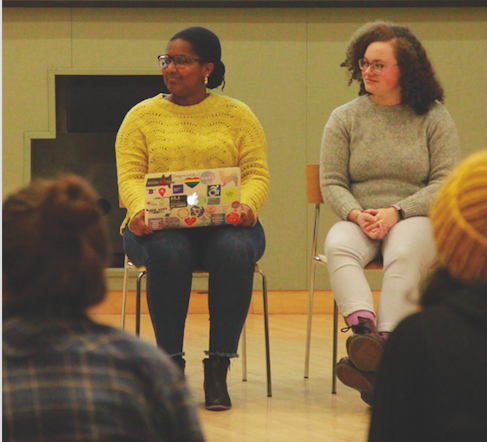Students convened in the Shapiro Campus Center (SCC) Multipurpose Room on Monday, Feb. 3, for an event to discuss the power of protest at Brandeis, in light of the recent amendments to Section 7 of the University Rights and Responsibilities, as well as last year’s #StillConcernedStudents protest and the events involving the IfNotNow group on campus, according to the organizers.
The event, organized by the Feminist Majority Leadership Alliance (FMLA) and the Women of Color Alliance (WOCA), saw around 50 students participate in an open circle discussion regarding the state of protesting at Brandeis and the administration’s responses to issues raised by student groups on campus.

Photo by Grace Zhou/The Hoot.
The #StillConcernedStudents protest took place in May 2019, and saw remaining students from the 2015 #ConcernedStudents protest call for greater transparency from the Department of Community Living (DCL) and Public Safety, in light of student concerns for the safety of students of color and LGBTQ students on campus. Event organizers also drew attention to two incidents involving an art installation commissioned by Brandeis Hillel that took place in May 2019. According to a previous article from The Hoot, then IfNotNow-member Ari Albertson ’22 stated that the group had no involvement with the first defacement of the art installation, but the group took responsibility on its Facebook page for the cardboard sign posted on the repainted side after.
Attendees of Monday’s event highlighted the lasting impact of the #StillConcernedStudents protest in particular, with some alleging that promises made as a result of that protest remain unfulfilled. One student present on the night said that they were part of the #StillConcernedStudents group.
“One of the main reasons I applied [to Brandeis] was social justice,” said the student. “It should be changed to social justice if you have permission… [the University response] pissed me off… they didn’t take us seriously.”
The amended Section 7, which saw the addition of explanations for the existing policies, was sourced from the student handbook at Princeton University, according to a letter to the editor written by the faculty of the Department of African and African American Studies (AAAS) to the Justice. The same student questioned that decision, stating, “We’re supposed to stand out, so why are we following these other private colleges? I would have made a different [college choice] decision if I’d have known.”
According to a September 2019 article from The Hoot, University President Ronald Liebowitz said of the policy, “Even free speech has limits. I think that’s where we’re trying to strike the balance. We’re not trying to quell civil disobedience or protest, we think that’s part of the students’ education and a part of our history, and it’s also important in higher education.” Lisa Lynch had previously told The Hoot that the Section 7 amendment did not include new restrictions, but instead offered explanations of the existing policies.
Another student commented, “It was clear that the policy change was an indirect response to the #StillConcernedStudents protest. All of the issues raised weren’t addressed at all. It’s messed up that this university says that they’re a social justice school. It pisses me off that they’re trying to have it both ways.”
Students spoke mostly to concerns involving the safety and position of students of color at Brandeis and the ‘silencing’ of individuals who raise issues by the administration. Students raised concerns, too, about the status of the amended Section 7, one student describing it as “an active barrier to protest. [Providing] the time and location [of a protest] gives them an easy way to silence you.”
The FMLA did not respond to The Hoot’s request for a comment by press time.


